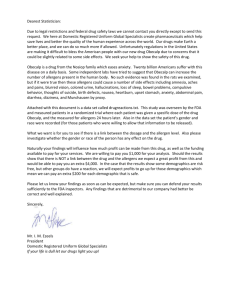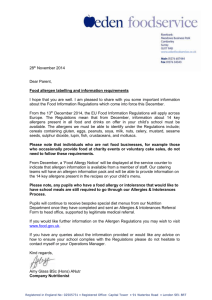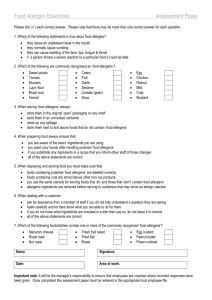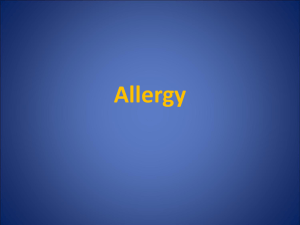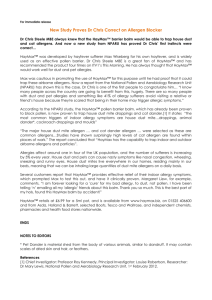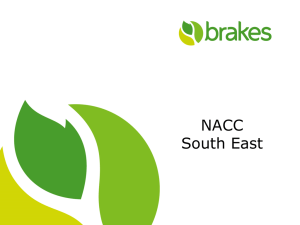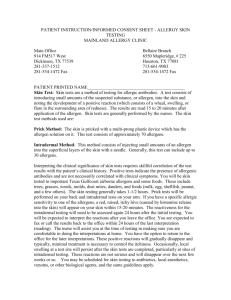Food Allergens
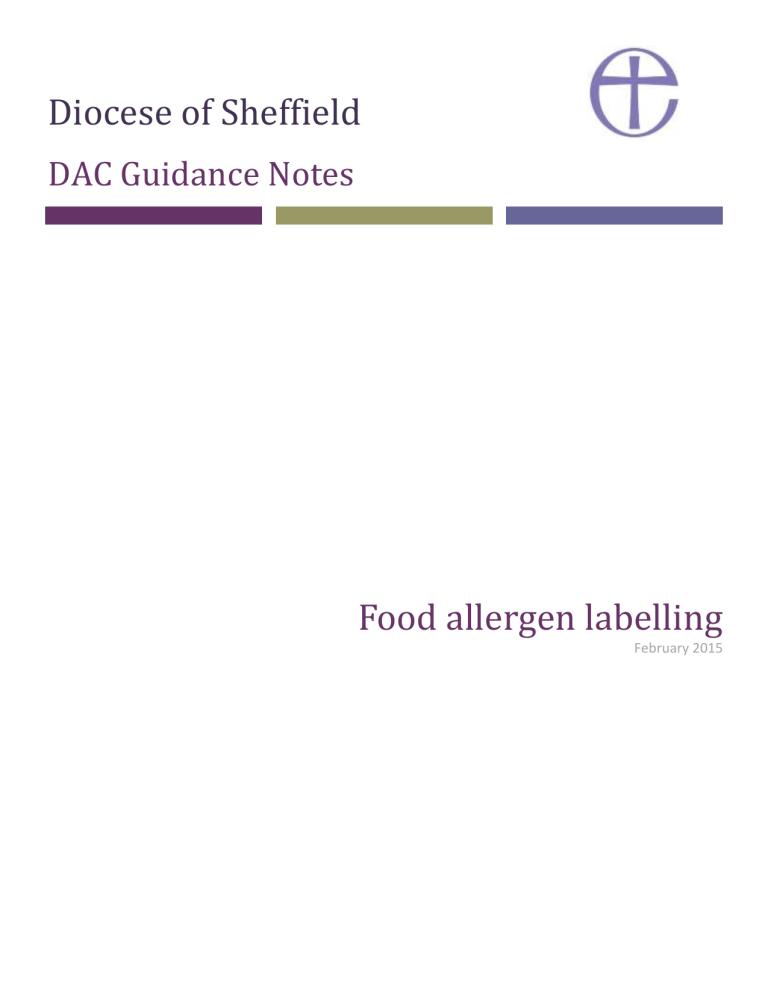
Diocese of Sheffield
DAC Guidance Notes
Food allergen labelling
February 2015
+
Diocese of Sheffield DAC
Food allergens
2
Labelling of Food provided by churches
Allergies are a growing health concern in the UK. They are life changing and in serious cases can be fatal, or lead to long-term health conditions. It is estimated that 21 million people in the UK suffer from at least one type of allergy. Up to 8% of children and 2% of adults are diagnosed with a food allergy and at least 1 in 100 people have coeliac disease. Having the information to eat, order food and shop wisely can make a great difference. In its guidance, the Food Standards Agency says.
‘There is no cure for food allergy. The only way someone can avoid getting ill is to make sure they don’t eat the foods they are allergic to. If you work with food, it is important to take food allergy seriously.’
Legislation brought into force on 13 December 2014 changes the way allergen information has to appear on labels and on food that is pre-packed, sold loose or served when you are eating outside of the home. The new rules apply to both commercial and not-for-profit food sales and require information about 14 specified allergens to be displayed on a menu or noticeboard, or included in an information pack. If someone with a food allergy asks if a certain product contains allergens you should be able to let them check the ingredients so that they can decide whether or not to eat it. Never guess or make the decision on their behalf.
If your church or community centre serves home-made or purchased foods to members of the public, or provides meals or other foods as part of a café or lunch club, then you will need to provide information about their contents and possible allergens. Private individuals who occasionally sell or offer food at local charity or community events are exempt from the allergen information requirements. However, if an individual is providing food as a food business operator or provides products for consumption to one, such as a church café or regular lunch club, then the necessary allergen information should be provided. If events where food is served take place on a regular basis such as weekly or monthly, then the event may not be considered as
+
Diocese of Sheffield DAC
Food allergens
3 occasional. Due diligence will be required when members of the public or church community are offered food that may cause allergens. As the incidence of food allergies is increasing it is good practice that Christian hospitality should make available this information. A copy of the relevant government legislation can be found here
Relevance to Churches
The Food Standards Agency was consulted about the impact of the Regulation on Churches and charities.
There are two issues here the application of the Food Hygiene regulations and the Labelling of foods in relation to potential allergens. The FSA replied as follows (but with various parts italicised for additional emphasis).
“With regard to frequency and whether any church will need be registered as a food business this would be determined at a local level as there are several factors to be considered such as size of the event, frequency, type of food being provided (whether it is high or low risk with regard to microbiological safety as well as allergens). There is no set time which determines what is more than occasional and the local Environmental Health Department which the church is based would be best placed to determine the status of the food activity.
Generally operations such as the occasional handling, preparation, storage and serving of food at events - organised charities, fetes, church events etc. are not covered by the scope of the food hygiene regulations (‘Regulation 852/2004 on the hygiene of foodstuffs’). However, under Regulation (EC)
178/2002, Article 14 (contains the food safety requirements) anyone selling or supplying food would be expected to provide food that is safe to eat; regardless whether the food is sold or supplied and whether the food is supplied for profit or not.
In relation to the new allergen labelling rules, individuals or undertakings not regarded as food businesses are exempt from the new allergen requirements. Whether you are a food business depends on how often the church provides free lunches; weekly and monthly infer a frequent and regular occurrence. Under the Food Information Regulations 2014, the business supplying the food has responsibility for ensuring that customers have the appropriate allergen information. However, even if
+
Diocese of Sheffield DAC
Food allergens
4 you are not considered a food business you may wish to offer the allergen information on a
voluntary basis.
The Food Standards Agency's advice to anyone providing or selling food to the public is to get in touch with the relevant local authority environmental health department (EHD). The EHD are in the best position to determine whether legislation (registration or licences) apply according to individual circumstances, such as frequency, types of food, size of the event etc. Decisions are made on a case by case basis. “
The FSA’s 2013 guidance on Community and charity food provision - guidance on the application of EU food hygiene law , dated 31 July 2013, is currently in process of revision and applies to England only. Until that is completed the guidance in Part 2: Principles on which registration on an operation are considered states that:
“… broadly speaking, the FSA suggests that provision of food less than once a month is not considered to have ‘a certain continuity of activities'. However, you also need to consider the degree of operation inherent in the operation. An operation where there is complexity in terms of the food safety controls, or where food is supplied to vulnerable consumers, may each require registration due to their degree of organisation, even if they occur less frequently.”
The guidance goes on to state that:
“Generally, community or charity operations providing food less frequently than one occasion per month should be considered as not having a continuity of activity and should not require registration.
However, some activities occurring less than monthly but involving complex food safety controls, or provision for vulnerable consumers may merit registration – the guidance ‘on a certain degree of organisation’ should be considered.
The following issues should be considered when deciding on how much any given operation can be said to be ’organised’:
Foodstuffs and risk. Consideration should be given to the risk presented by the food provided and the controls needed for safe food supply. Low-risk food provision such as tea and biscuits, packaged foods, and foods which can be kept at room temperature are all low-risk and do not require a significant degree of organisation. Operations with more complex safety controls,
+
Diocese of Sheffield DAC
Food allergens
5 such as those serving hot foods or food which otherwise require temperature control to remain safe will require more organisation.
Vulnerable consumers. If vulnerable consumers are being catered for (i.e. the elderly, infants under 5 years, expectant women or the chronically sick) then food providers must consider these risks and put suitable controls in place. This can be said to increase the level of organisation.”
In summary, a judgment based on their particular circumstances must be made by each PCC– but it is best to err on the side of caution.
Allergens to be highlighted
The new rules require records to be kept of all the ingredients in a recipe, including the ingredients of any bought-in products, such as sauces or mixes that are used. The information provided must be specific: it will not suffice to say that a food item might contain allergens. It is no longer permissible to include general descriptors such as ‘may contain nuts’ or ‘contains nuts’. It is essential that consumers are made aware of any food that may contain any of the 14 most common allergens. These are:
Crustaceans
Eggs which includes hen, duck, goose and ostrich etc.
Fish
Peanuts
Soybeans
Milk which includes cows, goats, sheep etc.
Nuts (almond, hazelnut, walnut, cashew, pecan nut, Brazil nut, pistachio nut and macadamia nut (also known as Queensland nut))
Celery (including celery leaves, seeds and celeriac)
Mustard
+
Diocese of Sheffield DAC
Food allergens
Sesame
Sulphur dioxide or sulphites (often found in dried fruit and wine)
Lupin (present in some flour)
Molluscs
Cereals containing gluten (including wheat, spelt, Khorasan, rye, barley, oats).
Various methods of display can be used to indicate the presence of allergens to the public, such as:
Labels adhered directly to the packaging of goods listing ingredients with allergens in bold, italics, highlighted or underlined.
A list of ingredients displayed next to the relevant food with allergens in bold, italics, highlighted or underlined.
A readily available file or folder containing lists of ingredients for all available goods listing allergens in bold, italics, highlighted, or underlined.
1.
A downloadable poster from the Food Standard Agency of the 14 most common food allergens can be found here
2.
A list of frequently asked questions can be found here
3.
More information on food allergens can be found here
6
